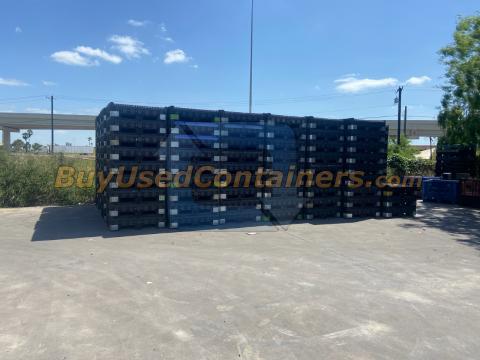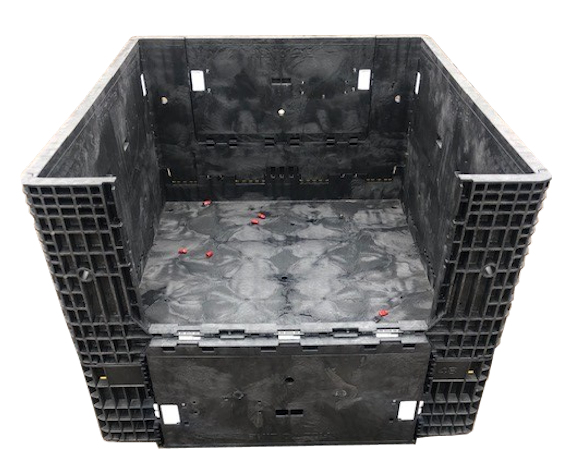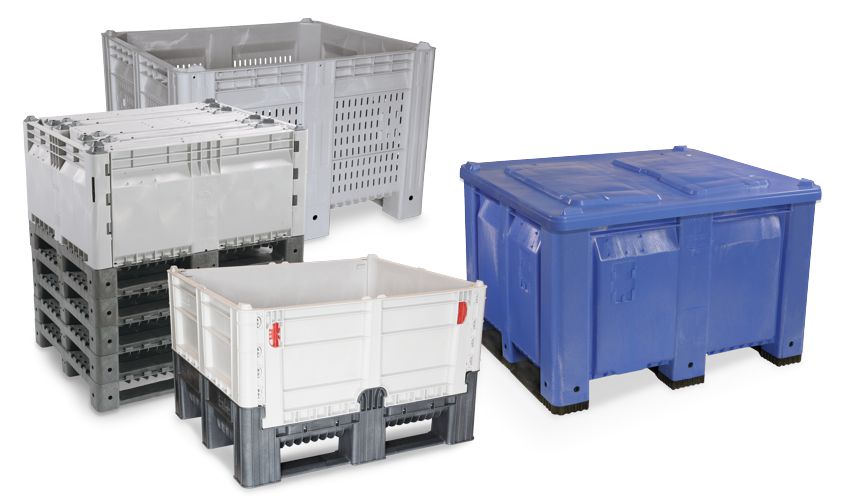Why Mass Containers Are Essential for Sustainable and Affordable Transport
Bulk containers play a necessary function in contemporary logistics. They facilitate the efficient motion of huge amounts of items, therefore optimizing transportation processes. This approach not only reduces prices however additionally minimizes environmental influence with lower discharges and waste generation. As industries look for more lasting practices, the adoption of mass containers is becoming increasingly considerable. What implications does this change hold for future logistics and supply chain management?

The Advantages of Making Use Of Mass Containers in Logistics
Mass containers reinvent logistics by improving efficiency and sustainability. These containers enable the transportation of large quantities of products in a solitary journey, considerably reducing the variety of trips needed. This not only improves operations yet likewise reduces labor prices connected with handling, loading, and dumping. Additionally, bulk containers are made to optimize area application within transport lorries, making certain that even more items can be shipped at the same time.
The standardization of bulk containers also streamlines the logistics procedure. With uniform dimensions, they can be conveniently stacked and kept, resulting in enhanced storehouse administration. In addition, bulk containers often include sturdy materials that safeguard components from damage during transportation, thus reducing product loss and boosting overall integrity. Therefore, organizations can experience improved supply chain performance, ultimately leading to boosted earnings and client fulfillment. This combination of factors makes mass containers a crucial asset in modern logistics.
Environmental Effect: Lowering Waste and Carbon Footprint
As sectors significantly focus on sustainability, the adoption of bulk containers has actually arised as a vital approach for reducing waste and reducing carbon footprints. These containers minimize the usage of packaging materials, such as boxes and plastic, thereby especially reducing total waste generation. By consolidating deliveries, bulk containers improve transportation efficiency, enabling for more products to be transported per trip. This reduction in journeys straight associates with lower greenhouse gas exhausts, contributing to a smaller sized carbon impact.
Additionally, bulk containers can commonly be reused or reused, additionally minimizing environmental effect. The resilience of these containers guarantees they can endure multiple transportation cycles, decreasing the need for single-use choices. used collapsible bulk containers. By enhancing logistics and advertising efficient resource use, bulk containers not just sustain lasting methods however also urge sectors to straighten with global ecological goals. Ultimately, their application mirrors a commitment to eco-friendly stewardship and accountable resource administration
Expense Financial Savings: Just How Mass Containers Lower Transport Costs
While many business seek methods to enhance their profits, using bulk containers presents a significant chance for decreasing transportation expenses. Bulk containers make the most of the volume of products transported, allowing companies to ship bigger amounts simultaneously. This efficiency decreases the number of trips called for, straight reducing gas prices and decreasing labor costs related to loading and dumping.
Additionally, mass containers typically include streamlined layouts that maximize area application within transport lorries. This suggests fewer empty spaces, resulting in more efficient use available capacity. Moreover, the longevity of bulk containers can reduce the danger of product damages during transit, minimizing losses and making certain that more products get here undamaged.
Enhancing Supply Chain Performance With Mass Storage Solutions
Bulk storage space options play a necessary function in enhancing supply chain performance by maximizing inventory monitoring. By settling products into less, bigger containers, businesses can substantially lower handling prices connected with frequent transfers and handling. This streamlined technique enables much better tracking and administration of supply, ultimately resulting in enhanced operational efficiency.
Structured Stock Administration
Effective stock monitoring is important for optimizing supply chain operations, specifically when companies adopt bulk storage services. These solutions allow organizations to preserve higher supply degrees while minimizing the frequency of replenishment. By consolidating products into bulk containers, companies can enhance their stock processes, decreasing the complexity associated with tracking numerous smaller sized packages. This method promotes accurate inventory matters and boosts projecting accuracy, enabling more informed decision-making. Furthermore, mass storage space remedies simplify stockroom organization, making it much easier to situate and access items when required. Therefore, organizations can achieve an extra effective inventory turn over rate, eventually boosting overall supply chain performance and decreasing the chance of stockouts or overstock situations.

Reduced Handling Expenses
The execution of mass storage space services not only streamlines supply administration but additionally significantly decreases handling costs throughout the supply chain. By combining materials right into mass containers, business decrease the demand for constant handling and transfer between various storage and transportation systems. This method lowers labor costs connected with loading, discharging, and moving smaller packages. In addition, mass storage decreases the regularity of shipments, causing lower transportation expenses and reduced fuel consumption. Therefore, businesses can maximize their logistics procedures, enabling for an extra reliable allotment of sources. Ultimately, minimized dealing with costs add to boosted total supply chain efficiency, fostering an atmosphere here that sustains both sustainability and financial viability.

Flexibility of Bulk Containers Across Numerous Industries
Many industries have distinct requirements for transport and storage, bulk containers have arised as a versatile service that satisfies a vast variety of demands. These containers, varying from large bins to specialized storage tanks, can fit diverse products, including powders, fluids, and granules. In the agricultural market, mass containers promote the transport of grains and plant foods, while the food and beverage industry uses them for active ingredients and finished items. The chemical market relies on mass containers for safely transporting hazardous products, making sure compliance with safety and security laws. Additionally, building and construction firms gain from mass containers for carrying aggregates and various other products. Their versatility reaches numerous modes of transport, including trains, vehicles, and ships, improving logistical performance. This adaptability not just enhances procedures throughout different markets but likewise promotes sustainability by minimizing product packaging waste and optimizing area en route. Bulk containers play a necessary role in contemporary supply chain administration.
Future Trends wholesale Container Use and Sustainability
The future of bulk container use is progressively shaped by cutting-edge materials development that improves sustainability. Additionally, automation in logistics guarantees to improve operations, reducing waste and enhancing efficiency. Embracing circular economic situation practices will additionally change how bulk containers are created, used, and reused, fostering a more sustainable transport landscape.
Cutting-edge Products Development
As sectors significantly focus on sustainability, innovative materials development wholesale containers arises as a significant consider enhancing environmentally friendly transportation options. Scientists and producers are exploring eco-friendly plastics, recycled compounds, and lightweight steels to minimize ecological influence. These products not just reduce waste yet also improve gas performance by reducing the overall weight of containers. In addition, innovations in clever products, which can adjust to varying conditions, enhance the longevity and functionality of mass containers. The integration of these cutting-edge products lines up with circular economic situation principles, advertising reuse and recycling. As the demand for lasting practices grows, the development of such products will play a crucial role in forming the future of bulk container use in logistics and transport.
Automation in Logistics
Considerable improvements in automation are positioned to change logistics and the use of bulk containers, improving sustainability in transport. Automated systems, including drones and autonomous lorries, are improving the movement of bulk containers, decreasing the reliance on conventional fuel-powered transport. These modern technologies enhance directing and packing procedures, reducing empty miles and improving gas efficiency. Additionally, automated inventory administration systems enhance tracking and surveillance of bulk containers, ensuring much better source allowance and minimized waste. The integration of the Web of Things (IoT) permits real-time data analysis, allowing aggressive decision-making that lines up with sustainability goals. As automation remains to evolve, it is anticipated to drive even more developments in bulk container usage, ultimately supporting even more sustainable logistics techniques and decreasing the ecological effect of transport.
Round Economic Situation Practices
Developments in automation are setting the phase for an extra incorporated technique to round economic situation techniques in the domain name of bulk container use. As markets increasingly accept sustainability, bulk containers are being designed for durability and reusability. This shift not only reduces waste but likewise boosts resource performance. Business are taking on techniques such as closed-loop systems, where utilized containers are collected, reconditioned, and reintroduced right into the supply chain. Furthermore, smart innovations track container life process, assisting in much better management and decreasing ecological effect. The partnership in between suppliers, logistics providers, and end-users is essential in developing requirements for lasting container usage. used collapsible containers. Future patterns suggest an expanding focus on materials that are biodegradable and recyclable, additional enhancing the round economic climate's principles wholesale transportation

Regularly Asked Concerns
What Materials Are Mass Containers Normally Made From?
Bulk containers are usually built from sturdy products such as high-density polyethylene, light weight aluminum, steel, and cardboard. These materials give toughness, defense, and convenience, making them ideal for delivering different goods in various industries effectively.
Just how Do I Select the Right Size Mass Container?
Choosing the right size bulk container involves examining the quantity of products to be transferred, thinking about taking care of tools compatibility, and assessing storage area needs. Appropriate size warranties performance in transportation and minimizes waste during shipment.
Are Mass Containers Reusable or Recyclable?
Bulk containers are usually recyclable, designed for numerous journeys, improving sustainability. Many can additionally be recycled, relying on the products made use of. Picking recyclable choices additionally lowers and supports ecological objectives waste in transport practices.
What Safety Regulations Apply to Mass Container Transport?
Safety and security regulations for bulk container transportation include conformity with the Division of Transportation guidelines, correct labeling of dangerous materials, architectural integrity analyses, and adherence to weight limitations to ensure safe handling and protect against accidents during transportation.
Exactly How Can Organizations Shift to Using Bulk Containers Properly?
Services can change to bulk containers by evaluating current logistics, educating staff on handling, investing in suitable devices, maximizing stock administration, and teaming up with suppliers to ensure compatibility and efficiency throughout the supply chain.
As markets significantly focus on sustainability, the fostering of bulk containers has emerged as a key technique for minimizing waste and decreasing carbon footprints. By settling products right into bulk containers, business can streamline their supply procedures, minimizing the complexity associated with tracking multiple smaller sized bundles. As industries progressively prioritize sustainability, ingenious materials growth in mass containers arises as a considerable variable in enhancing environment-friendly transportation options. Automated systems, including drones and autonomous lorries, are streamlining the activity of mass containers, minimizing the reliance on typical fuel-powered transport. Additionally, automated supply management systems boost monitoring and monitoring of mass containers, making sure much better resource appropriation and reduced waste.